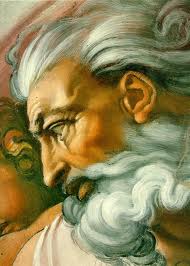
Another one of our parish churches is closing down. Parishioners who spent the greater part of their lives supporting and contributing to this church are angry. In a moment, everything collapsed. The archdiocese decided to close it.
Grief, regret, sadness, anger, disappointment, frustration—some of the feelings we have about what’s going on in the Church today. Suddenly it seems the rug is being pulled out from under us.
Then some well-wisher comes along and says, “You shouldn’t feel that way, after all…” We are all uncomfortable with negative feelings, and believe that there is no place for such sentiments in the Church.
Today’s readings tell us otherwise. In the first reading we are told about God’s feelings (Genesis 6:5-8; 7:1-5,10).
“When the Lord saw how great was man’s wickedness on earth, and how no desire that his heart conceived was ever anything but evil, he regretted that he had made man on earth, and his heart was grieved. So the Lord said: ‘I will wipe out from the earth the men whom I created…for I am sorry that I made them.’”
God delighted in fashioning human beings in his own image and likeness. He dreamed of building up his family on earth. Then his dreams began to shatter; sin entered in. In his mercy, God put together a “Plan B.” The children of Adam and Eve, we are told, made it a habit of offering the first fruits of their labor to God. They wanted to do their best to stay connected with God. Sadly, however, sin again entered the picture. Cain killed his brother. Though a strain of goodness persisted, evil began to win the battle. God realized that what his heart conceived would not come about. He decided to wipe out his creation.
Then, a small light began to emerge in the darkness to mollify God’s grief.
“But Noah found favor with the Lord. Then the Lord said to Noah: ‘Go into the ark, you and all your household, for you alone in this age have I found to be truly just.’ Noah did just as the Lord had commanded him…(then) the waters of the flood came upon the earth.”
Because of the obedience of one man, God modified his plan to wipe out the human race. Eight people were saved, and through them God generated his “Plan C.” Out of the darkness, new hope emerged.
We know that there is not a “happily ever after” ending to this story either. Even among Noah’s descendants, wickedness reared its ugly head. Then came a “Plan D”—the descendants of the obedient Abraham. From Abraham’s grandson, God created a people—the Israelites. This didn’t work out too well either; there was a time when Israel’s sin became so widespread that God wanted to wipe them out. Moses, as we know, intervened and stayed the hand of God.
Finally he moved into “Plan E” by sending his only begotten Son to earth. The obedience of Noah, Abraham, and Moses culminated in the perfect obedience of Jesus Christ, who became obedient even to death on a cross. In Jesus God began a “new creation.” And so his saving power was released in abundance on the earth. Through Jesus each of us has the option of entering into God’s “new creation.”
His grief was alleviated in the Son with whom he was “well pleased.” As we surrender ourselves more and more to Jesus, may God find in each of us a child with whom he is “well pleased.” Let’s exercise today our power to bring joy to God’s heart.
“God so loved the world that he gave his Only Begotten Son…” (John 3:16).
